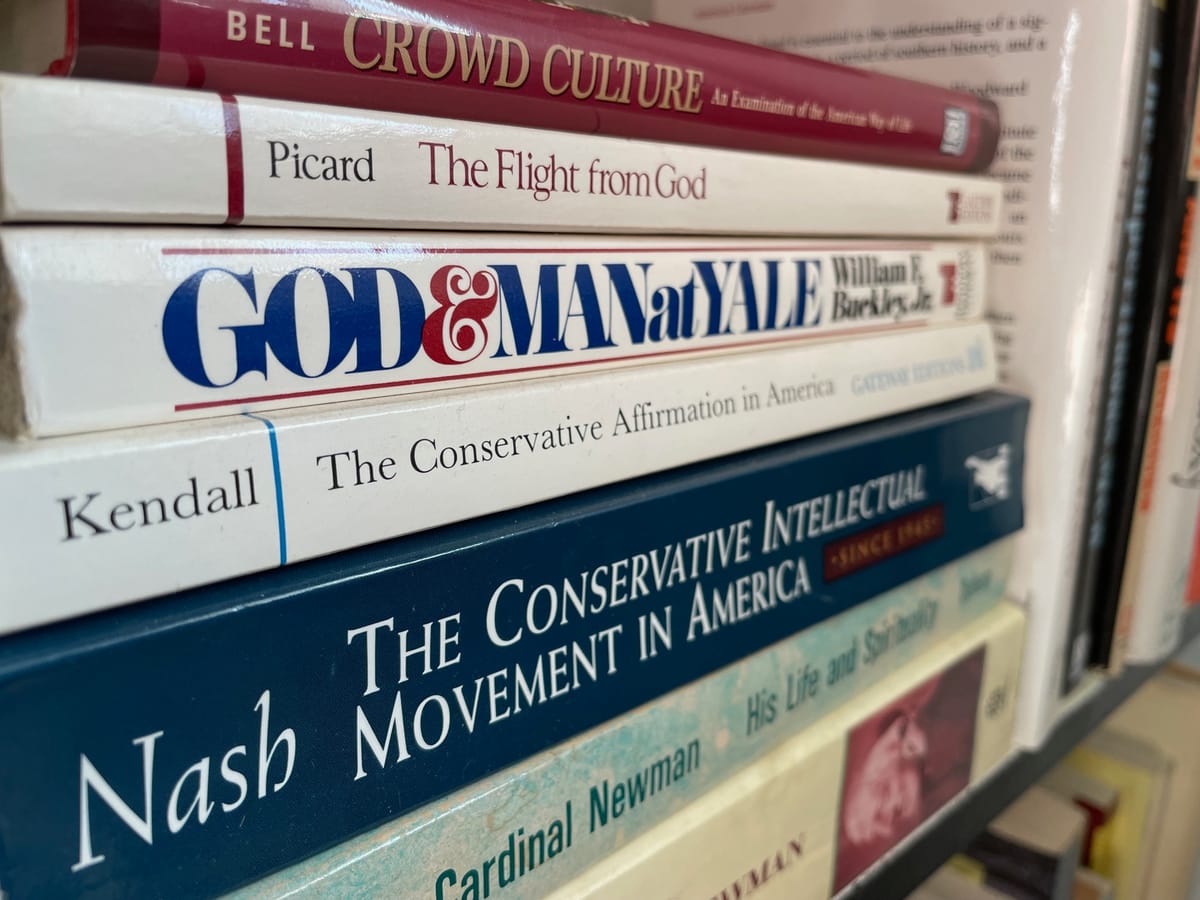Battles on the Right

A new battlefront has opened on the political right: localists v. monoliths.
It's the latest version of the libertarian-conservative debate that George Nash described marvelously in his major work. The localists in the current debate are the libertarians and the monoliths are the conservatives.
I say "monoliths" because they welcome the central state. They just want it to do what conservatives want instead of what liberals want. Patrick Deneen is their leader and his recent book is their nascent textbook.
I can't even bring myself to read the book for the same reason I've never read the Koran: life is short and I don't have time to waste on something I know is false.
But he has allies. I've been assured by one trusted scholar that he's a genius. His ideas need to be reckoned with. I suspect I'll start his book shortly.

The New Debate on the Right Through the Lens of Existence Strikes Back and The Hemisphere Hypothesis
I plan on looking at them through the lens of The Hemisphere Hypothesis and gnosticism. Now that I've discovered that gnosticism is a spectrum disorder, it provides a good tool to inspect intellectual movements, albeit an inexact and easily-abused one.
My thoughts revolve around the need for freedom. Each person needs to seek truth in an ever-changing world, which means each person needs to be free from outside coercion. Because government (acting with force of law and superior rifle power) has the most significant ability to restrict freedom, people need to be free from government force as much as possible.
Applied to The Hemisphere Hypothesis and gnosticism:
- The monoliths favor less freedom. They want the government to show people how to discover truth. They tend to view truth as static, which it isn't. It's permanent but that's not the same thing as "static." "Static" implies it doesn't move: that it can be captured and applied. "Permanent" means it's always there and always will be, even though we can only glimpse it darkly and it can never grasp it. It is the Tao.
- The gnostic assumes truth is static, he has captured it, and he knows how to force his captured reality on everyone else through the State. This places the conservative monolith further up the gnostic spectrum.
- It's also left hemispheric. The left hemisphere needs certainty so it can act. It needs to think it has captured truth. To the left hemisphere, it's better to have a wrong truth than no truth at all, so it convinces itself that it's correct, even if it might not be. The left hemisphere loathes paralysis by analysis. It doesn't have time for "mental masturbation" and like approbations.
Localism
I've repeatedly been stressing that localism is the primary societal means to resisting gnosticism.
Let me be clear: Localism is the primary societal means of resisting gnosticism. The primary means is for each of us to re-attune ourselves to the Tao through reasserting our right hemispheres, but after ourselves (and, by immediate extension, our families), the Tao re-levens society by infiltrating it at the local level.
Hence, the local needs to be nourished, and the central state--beholden to its left-hemispheric gnostic masters--wants to cut off the nourishment, so the right hemisphere and Tao can't reassert themselves. The State kills the intermediary institutions that give people meaning, thereby destroying the local.
So to the extent that the new conservative monoliths want to maintain the State (acting through its shadowy administrative bureaucracy), they are crippling any chance for the right hemisphere and Tao to re-emerge.
Interestingly, they even seem to realize this.
In a recent essay by Tyler Syck (which catalyzed this essay), he notes that the monoliths recognize that societies are built from the ground up, using smaller building blocks, but seem shockingly oblivious that bigness crushes the little. Here's Syck, taking apart monolith conservative Nick Solheim's purported sympathy with the local:
Solheim is entirely correct to point out that “societies are not built on individuals but on households, congregations, towns, and counties.” These are indeed the foundations of any happy society and the bastions of freedom in our modern world. If only Solheim did not clearly support the exact mindset that is leading to their untimely demise. Immediately after defending local institutions as the home of true civilization, he states that what America really needs is “a hero”—someone whose legitimacy stems not from votes but the “unyielding pursuit of a common cause” that “rewards friends and punishes enemies.” Such authoritarian leaders are not particularly famous for respecting local sovereignty. If Solheim really wished to promote subsidiarity, he would call for leaders who surrender authority rather than seize it. For these little platoons are sustained not by foisting upon society a particular conception of the common good, as Solheim would clearly like to do, but by surrendering such questions to them. A new right sophist forcing his views upon a small progressive parish in Massachusetts is no different from a progressive activist in California forcing his views upon a conservative church in Alabama. Both undermine the power of intermediary institutions. Of course, it is possible that Solheim simply sees the local communities he so cherishes as the best path to enforcing his social views throughout the entire country. This, at least, would make his political position coherent, even if more terrifying.

Distributism
Localism is the societal companion of political philosophy's principle of subsidiarity and of economics' distributism.
At the same time that Deneen is attacking libertarianism and, perhaps inadvertently, its lovely child, localism, other folks on the right are attacking libertarianism's more problematical child, capitalism.
Their leader is Sohrab Ahmari and their textbook is Tyranny, Inc. I really like Ahmari: Catholic convert, great writer, (seemingly) an all-around good guy, and a fan of distributism.

Unlike Deneen's, I am very tempted to read Ahmari's book.
One of the principle features of gnosticism is an unwavering conviction by a gnostic that he's correct. The gnostic is smug, dismissive of opponents, and uncompromising. His perceived structure of reality is real and everyone else can die without hospital care because they didn't get the vaccine.
In fact, if smugness were the only gnostic trait, today's libertarians would register high on the gnostic spectrum. Many of them are, quite frankly, insufferable, so even though I lean toward their positions, I don't like to.
Enter Ahmari.
He's attacking capitalism and, by extension, libertarianism as preached today on the right. And even though I'm not sure how he purports to deal with the (humongous, primordial, and only really salient) problem of Hudge and Gudge (and until he does, I hold serious reservations about his ideas), I'm curious to hear more from him because, even though he has strong opinions, they seem tempered by prudence, which, by its nature, is tentative, listening, adaptive to changing conditions, and non-dogmatic. Prudence is, in other words, everything gnosticism isn't.
Ahmari's prudential approach is on display in the current issue of First Things, which has always been a flagship for capitalism and Christianity, while, at the same time, subordinating the former to the latter. From the conclusion of a review-essay of Tyranny, Inc.
Communists and market fundamentalists reach different conclusions, of course, but they share a simplistic, black-and-white understanding of political economy. The market is true freedom, or the market is pure coercion; only government can solve problems, or government can only make them worse. Seeking the places in between these extremes where real people live and real markets operate, Ahmari shows the potential of returning genuine conservatism to the economic sphere.

The Problem for Ahmari is that the Fundamental Economic Fact that Seems to Drive His Analysis Doesn't Exist in the Current Economy
Ahmari seems to emphasize that the employer-employee relationship is one-sided: The employee needs the job far more than the employer needs him.
Such an assertion is oh-so 2019!
Every employer knows that the employees now hold a lot of power. The United States has an immense labor shortage. If we want to continue to keep the playing field level, we just need to do one thing: Plug the gaps in the Eagles Passes of our country. That'll keep the labor shortage going.
If we want to tilt the playing field in favor of the employees, we can institute universal minimum income and expand Medicaid for all . . . and maybe throw in more free cell phones and EBT cards. That'll make it impossible for employers to treat employees poorly because no one will need their jobs.
I'm not saying any of the above should occur, but the fact remains: For four years now, the disparate bargaining power between employer and employee hasn't existed and I don't see it returning to Industrial Revolution-Modernity-Postmodernity market norms any time soon.
Is it the new normal?
I have no idea, but at this moment, Ahmari's fine-sounding book is built on a foundation that doesn't exist.
This topic will continue to engage me. It's a bit distressing that we need to take a detour to deal with such distractions from friends like Deneen since the night draws near and immediate action (action by our left hemispheres as instructed by our right hemispheres) is needed, but that's just the way it is.
And besides, let's face it: If we're going to subdue the left hemisphere and, with it, the continued gnostification of America, we're going to need Providence, and Providence acts how It will, through the Tao, often mysteriously, always outside anything we can control, and normally outside anything we can even influence.
We can only welcome and cooperate with it. So let's deal with the distractions as they present themselves, order our own little corner of the world, enjoy wine and good company, and continue to hope.


